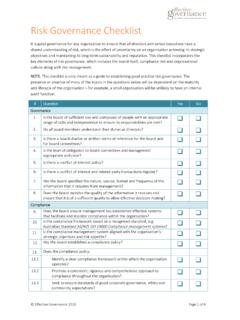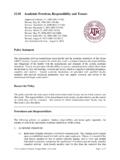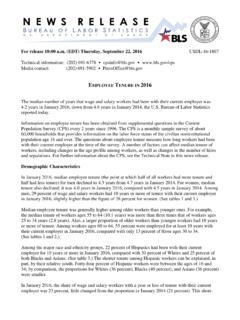Transcription of Director Tenure v0.1 7Jul14 - Effective Governance
1 Effective Governance Pty Ltd Suite 6, Level 3, 16 McDougall Street PO Box 2140 Milton Qld 4064 (07) 3510 8111 (07) 3510 8181 Director Tenure James Beck and Jennifer Tunny July 2014 Director Tenure July 2014 Prepared by Effective Governance Page 1 Director Tenure A topic of increasing focus for boards is the impact Director Tenure has on performance. Many Governance authorities recommend a limitation on the length of service of a Director for two reasons: 1. There is a concern that independent directors may lose the independence and the external viewpoint that they were intended to bring to the board if they remain on a board for an extended period. This can be as a result of becoming too trusting of particular executives (or to a lesser extent by alignment to a faction of a board). 2. Some commentators voice a concern that a long serving Director s contribution and usefulness may wane (for example, as a result of running out of new ideas) or become less relevant to the organisation s In the latest edition of the ASX Corporate Governance Principles and Recommendations (ASX Principles), which many organisations uphold as leading practice, the ASX Corporate Governance Council (ASXCGC) decided not to specify a recommended maximum length of Tenure for independent directors after public consultation.
2 Instead of specifying that a Tenure of over nine years may compromise Director independence, the final ASX Principles state that there may be doubts about the independence of a Director if he or she has been a Director of the entity for such a period that his or her independence may have been compromised .2 The ASXCGC has also included the following guidance in the commentary to the current ASX Principles: The Council recognises that the interests of a listed entity and its security holders are likely to be well served by having a mix of directors, some with a longer Tenure with a deep understanding of the entity and its business and some with a shorter Tenure with fresh ideas and perspective. It also recognises that the chair of the board will frequently fall into the former category rather than the latter. The mere fact that a Director has served on a board for a substantial period does not mean that he or she has become too close to management to be considered independent.
3 However, the board should regularly assess whether that might be the case for any Director who has served in that position for more than 10 As such, listed entities now need to explain why the independence of directors with more than 10 years service has not been compromised by their length of service. Indeed, a growing number of countries have adopted specific Tenure related guidelines or restrictions for independent directors. With very few exceptions, as in Australia, the comply and explain model prevails, and the recommended maximum Tenure for a non executive Director to be considered independent is between nine and 12 years. For example, the European Commission recommends that independent directors serve a maximum of three terms or twelve years. In the UK, the UK Corporate Governance Code (formerly known as the Combined Code) provides that a board should explain, in its annual report, its reasons for determining that a Director who has served more than nine years qualifies as independent.
4 Nine years has also been adopted as the appropriate yardstick for Director Tenure in Singapore, South Africa and Hong Kong. 1 Kiel, G., Nicholson, G., Tunny, J. A. & Beck, J., 2012, Directors at Work: A Practical Guide for Boards, Sydney, Thomson Reuters. 2 ASX Corporate Governance Council, 2014, ASX Corporate Governance Principles and Recommendations, 3rd edn, Sydney, Australian Securities Exchange, Box , p. 16. 3 ASXCGC, 2014, p. 17. Director Tenure July 2014 Prepared by Effective Governance Page 2 Of note, Institutional Shareholder Services (ISS) and other shareholder activist groups are beginning to include Director Tenure in their checklists as an element of Director independence and board composition on the basis that limiting Director Tenure allows new directors to the board to bring fresh perspectives. This focus on board Tenure is further supported by the research of Huang,4 which is summarised in Figure 2.
5 Figure 2 plots Tobin s Q against board Tenure using coefficient estimates from the The empirically observed peak value in Tobin s Q is around a board Tenure of nine years. As the figure illustrates, a small change in board Tenure does not have a uniform impact on firm value. For example, with all the control variables held at their respective mean, for an average board Tenure of three years, an additional year of Tenure increases firm value by an average of , while for an average board Tenure of 15 years, adding one year to board Tenure decreases firm value by an average of These results are consistent with the interpretation that the marginal value of learning exceeds the marginal cost of entrenchment when board Tenure is shorter, but that the entrenchment effect dominates the learning effect as board Tenure continues to Figure 2: Board Tenure and firm value7 Source: Huang, 2012, figure 2, p.
6 51 Number of terms Related to Tenure is the number of terms that a Director can be expected to serve. Some boards find it helpful to ensure a constant supply of new blood to the board to maintain board engagement, relevance and rigour. But this must be balanced with the need to protect the corporate memory of the board. To that end, boards often find it helpful to stipulate a maximum number of terms a Director may serve. Generally, boards that set a maximum term tend to stipulate two or three terms (for a 4 Huang, S. 2013. Zombie Boards: Board Tenure and Firm Performance (July 29). Available: or 5 The Tobin s Q ratio is a measure of firm assets in relation to a firm s market value. A Tobin's Q ratio greater than 1 indicates the firm has done well with its investment decisions. It is named after its developer, James Tobin, a Yale University economist and Nobel laureate.)
7 6 As Huang (2013, p. 3) notes, board Tenure is an ideal measure to capture the trade off between knowledge accumulation and independence on boards. 7 Huang (2013) uses the term outsider board Tenure to mean independent, non executive Director Tenure . Director Tenure July 2014 Prepared by Effective Governance Page 3 three to four year term of appointment). The exception to this general rule is the chair. It is often appropriate to provide for an additional term of office for this role. What can the board do about long serving directors? In my experience, convincing long serving directors to retire from the board can be difficult where there is no policy or constitutional reason for doing so. There are two reasons for this. First, for some directors, their directorship has become the last source of any income outside of a superannuation or public pension. They do not want to leave because the money is important.
8 Second, but not necessarily mutually exclusive, the directorship may have become the last link the Director has with their previous professional or business life. At the same time they might have become emotionally bonded with the organisation it has become such an important part of their life that it is a major reason for being giving purpose to their existence. In these circumstances, seeking to have the Director step down from the board can be fraught with difficulty both with the individual and how the action may be perceived by the person s friends and supporters in the organisation. In such circumstances, policies which allow the organisation to celebrate and acknowledge the contribution, such as awards, honorary life membership or other form ongoing association, other than as a Director , are important. Conclusion In line with leading practice recommendations, many organisations are now adopting a limit of 10 years for a Director to serve on the board.
9 In my experience, limits set into the constitution are only desirable where the organisation has a culture of long termism by directors. In some cases, it is desirable to use a constitutionally mandated limit to ensure Director renewal. In other cases, it might be Effective to have a policy which seeks to ensure adequate board renewal together with a culture that promotes a regular introduction of new blood onto the board. Furthermore, it is incumbent on the chair to plan for and promote discussion of board renewal.








